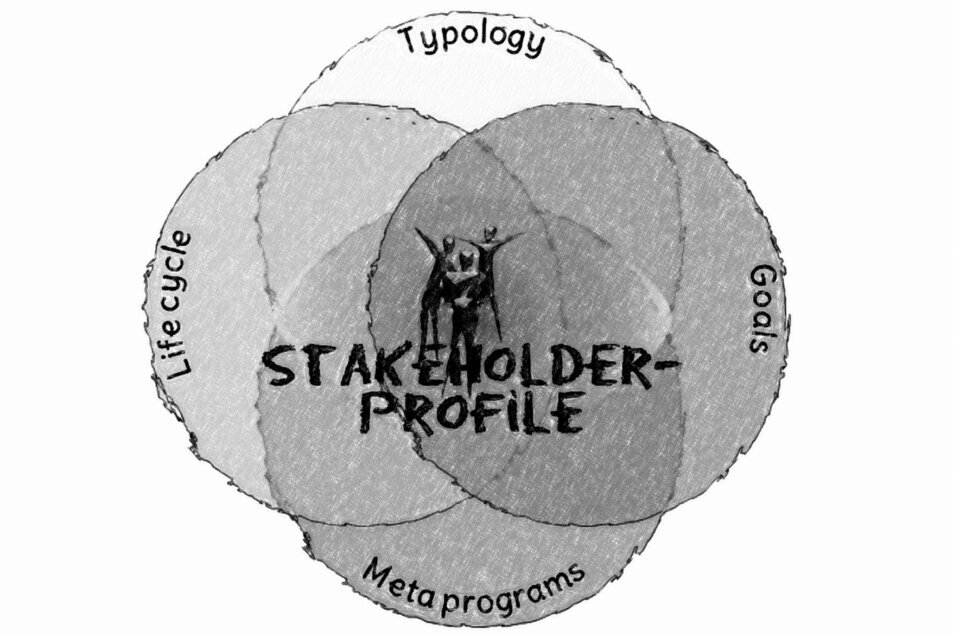Profiling
Problem
Customer-related
activities are carried out without understanding the needs of the target groups
or personas. As a result, measures often fail to meet their expectations,
resulting in insufficient appreciation and low customer satisfaction levels. It
applies not only to external customers, but also to all internal recipients.
Challenge
A model for
the target groups or descriptions of the intended personas is needed. It is not
possible to identify all individual customer needs or respond to all of them.
Ways must be found to anticipate the majority and adapt the measures
accordingly.
Solution
Carry out
target grouping by selecting domains from the target group model and
determining target groups/personas. To do this, the target groups/personas are
modeled, i.e.
- Anticipate the self-image of the target groups/personas
- Describe expectations
- Create a profile (including type, goals, metaprograms, and life cycle).
The image we have of individuals, groups, and cultures - the so-called profile - determines our activities. Even if many people struggle with such stereotypes, it is essential to recognize that our interactions with others often facilitate these conscious or unconscious perceptions. To avoid inappropriate generalizations and for a common description, it is advisable to use general descriptions.
Profile your interest groups - employees, partners, customers, and the public. The following memecon products are available:
Profiling always depends on the purpose, the individual perspective, and the perceived behavior of the target group. For this reason, the profiles can always be adjusted, expanded, or revised. Particularly interesting are external and self-image, whose differences become easier to understand and to discuss with a structured review.
Important: The profile is not the person! Nobody knows what someone truly thinks, means, or is. The profile is only a model that helps to improve perception and communication.

The following standard services are offered:
Target grouping
The target grouping simplifies the complexity of a project's target group. Therefore, target audience dimensions are developed, which describe the characteristics of the target group. In a one-day workshop, the target group portfolio is created from two of the most critical dimensions. Into this portfolio, target groups are eventually integrated.
The target grouping simplifies the complexity of a project's target group. Therefore, target audience dimensions are developed, which describe the characteristics of the target group. In a one-day workshop, the target group portfolio is created from two of the most critical dimensions. Into this portfolio, target groups are eventually integrated.
Short description:
- Categorization of interest groups
- Customized workshop layout (up to 4 days)
- Aspects include typology, goals, life cycle, and metaprograms.
- Integration and preparation of communication and interaction.
Stakeholder modeling
Stakeholder modeling categorizes interest groups into four areas: typology, goals, life cycle, and meta programs. Aspects are derived from it that improve collaboration with the target group. In a one-day workshop, you develop a collective structure for your target group.
Stakeholder modeling categorizes interest groups into four areas: typology, goals, life cycle, and meta programs. Aspects are derived from it that improve collaboration with the target group. In a one-day workshop, you develop a collective structure for your target group.
Short description:
- Stakeholder categorization
- Custom workshop layout (up to 4 days)
- Aspects include typology, goals, life cycle, and metaprograms.
- Integration and preparation of communication and interaction.
Target group modeling
Target group modeling characterizes target groups as preparation for communication measures in business enterprises, nonprofit organizations, and public administration. Three models are used for description: logical levels, expectations, and profile. In a one-day workshop, participants learn the structure of models and how to apply them effectively.
Target group modeling characterizes target groups as preparation for communication measures in business enterprises, nonprofit organizations, and public administration. Three models are used for description: logical levels, expectations, and profile. In a one-day workshop, participants learn the structure of models and how to apply them effectively.
Short description:
- Learn models for characterizing target groups.
- One-day workshop
- Aspects include design levels, expectations, and profile.
- Prepare detailed profiling.
Profiling improves with the explicit description of the target group, enhancing the accuracy of communication and change measures.

